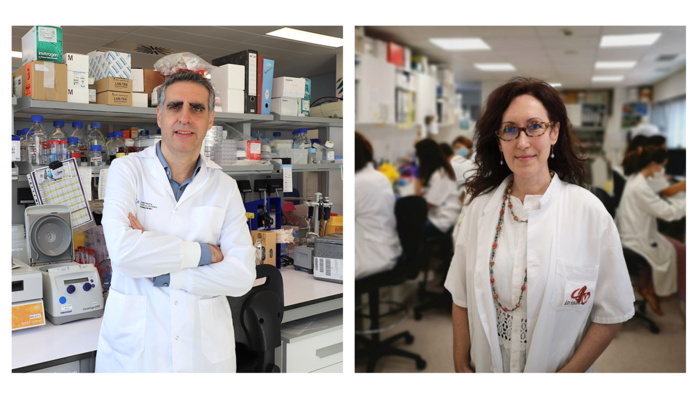June 27th, 2022. Researchers from the Cancer Epigenetics group led by Dr. Manel Esteller at the Josep Carreras Leukaemia Research Institute and Dr. Aurora Pujol, from the Bellvitge Biomedical Research Institute (IDIBELL), have identified an epigenetic signature associated to the development of the Multisystem Inflammatory Syndrome in Children (MIS-C) after a SARS-CoV-2 virus infection. The signature has been named EPIMISC, in line with previous studies on the epigenetics of COVID-19 from the same team.

Credit: Josep Carreras Leukaemia Research Institute
- Multisystem Inflammatory Syndrome in Children (MIS-C) is related with the epigenetic deregulation of a set of immune-controlling genes.
- The study shows that the epigenetic signature of MIS-C and Kawasaki Syndrome, both immune hyperactivation conditions, are very similar.
- Knowing this epigenetic signature may help anticipate, diagnose and treat children with MIS-C and potentially Kawasaki Syndrome, in the future.
June 27th, 2022. Researchers from the Cancer Epigenetics group led by Dr. Manel Esteller at the Josep Carreras Leukaemia Research Institute and Dr. Aurora Pujol, from the Bellvitge Biomedical Research Institute (IDIBELL), have identified an epigenetic signature associated to the development of the Multisystem Inflammatory Syndrome in Children (MIS-C) after a SARS-CoV-2 virus infection. The signature has been named EPIMISC, in line with previous studies on the epigenetics of COVID-19 from the same team.
The SARS-CoV-2 virus infection and the development of the COVID-19 disease have been a serious health, social and economic problem in the last two years. The massive implementation of vaccines has allowed a certain recovery of normality, but there are still many unanswered questions. One of the puzzles of infection with the virus has been the remarkable resilience of children to exhibit severe COVID-19. However, a small percentage of the pediatric population affected by the virus experienced a serious health condition called Multisystem Inflammatory Syndrome in Children (MIS-C), also known as pediatric inflammatory multisystem syndrome (PIMS), that require admission to intensive care unit (ICU) in around 60% of cases.
In MIS-C, different parts of the body can become inflamed, including the heart, lungs, kidneys, brain, skin, eyes, or gastrointestinal organs. The factors associated with the appearance of MIS-C beyond the presence of the virus are unknown.
In an article recently published in the journal EClinicalMedicine, the sister journal of The Lancet for rapid communication of clinical findings, Dr. Manel Esteller, Director of the Josep Carreras Leukemia Research Institute (IJC), ICREA Research Professor and Professor of Genetics at the University of Barcelona and Dr. Aurora Pujol, also an ICREA Professor and Head of the Neurometabolic Diseases Group at the Bellvitge Biomedical Research Institute (IDIBELL), and member of the Spanish Network for Rare Diseases CIBERER, demonstrates that there are epigenetic changes linked to the triggering of MIS-C, at least in the studied cohort population.
“The COVID-19 disease in adults is characterized by difficulty breathing, while the studied rare syndrome associated with the same virus in children affects many more organs and can have severe consequences. As the bases for the disorder are unknown, we decided to compare the epigenome of healthy children, children with COVID-19 without MIS-C, and children with COVID-19 who experienced MIS-C”, explains Dr. Esteller in relation to the article and adds: “We found that MIS-C is characterized by a specific deregulation of epigenetic cellular programming that leads to a landscape of hyperinflammation that can damage tissues”.
The results of the study, signed by Dr. Verónica Dávalos and Carlos A. García-Prieto as first authors, showed that specific genes were affected in patients, such as those associated with the activation of T lymphocytes, natural killer cells, the recognition of antigens and coagulation. This pattern of epigenetic deregulation was also observed in Kawasaki Syndrome, another inflammatory disease that peaked in 2009 and possibly linked to infection with the influenza virus A H1N1.
Interestingly, two of the 33 DNA methylation events that define the EPIMISC signature are also characteristic of adults without comorbidities who develop severe COVID-19 disease, as previously defined in the EPICOVID signature found by the same team last year. This fact confirms that both processes, MIS-C in children and severe acute respiratory distress syndrome in adults, are inflammatory post-infectious complications and could be treated in a different way than the initial phase of the viral infection. On this regard, researchers hypothesize that pharmacological inhibition of the CUL2 gene, a mediator of inflammation, could be useful for MIS-C patients since it is known to protect against hyperinflammatory responses.
This is an unusual feature and Dr. Pujol notes that “It is interesting to see that two disorders that exhibit similar clinical manifestations, MIS-C and Kawasaki, also share a common epigenetic signature, which is different to the epigenetic signature caused by other viruses including HIV”. In the same line, Dr. Esteller concludes that “it seems that in both syndromes, MIS-C and Kawasaki, there is an exaggerated reaction of the children’s immune system against a viral attack. Knowing the mechanisms triggering both diseases will give us better tools to diagnose and treat them”.
Reference Article:
Davalos V, García-Prieto CA, Ferrer G, Aguilera-Albesa S, Valencia-Ramos J, Rodríguez-Palmero A, Ruiz M, Planas-Serra L, Jordan I, Alegría I, Flores-Pérez P, Cantarín V, Fumadó V, Viadero MT, Rodrigo C, Méndez-Hernández M, López-Granados E, Colobran R, Rivière JG, Soler-Palacín P, Pujol A, Esteller M. Epigenetic Profiling Linked to Multisystem Inflammatory Syndrome in Children (MIS-C): A Multicenter, Retrospective Study. EClinicalMedicine, DOI: https://doi.org/10.1016/j.eclinm.2022.101515, 2022.
Journal
EClinicalMedicine
DOI
10.1016/j.eclinm.2022.101515
Method of Research
Data/statistical analysis
Subject of Research
Human tissue samples
Article Title
Epigenetic profiling linked to multisystem inflammatory syndrome in children (MIS-C): A multicenter, retrospective study
Article Publication Date
25-Jun-2022
COI Statement
Dr. Esteller declares grants from Ferrer International, personal fees from Quimatryx, outside the submitted work. Dr. Rivière reports personal fees from Grifols, CSL behring and Takeda, outside the submitted work. The other authors declare no conflicts of interest.




